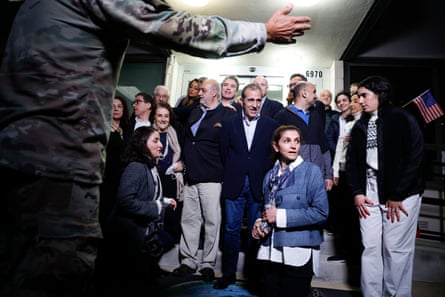[ad_1]
It was 8pm on a Friday night when his source texted him back. A potential deal was on the table.
He had been at a reception in Washington earlier that day where he heard that efforts were “dead in the water”. That confirmed reports he’d heard two days earlier saying the situation between Iran and the US was looking bleak. However, this text implied the opposite.
Jared was skeptical. He had been in this position before – about a dozen times, to be exact. After all, he’d been working on this case for almost seven years. But this time, it felt different. Call it a premonition, or an answer to prayer, but it seemed that the American-Iranian national Siamak Namazi might finally be released from Iran’s notorious Evin prison.
Namazi, who had been wrongfully detained since 2015, was one of five Americans released by Tehran on 19 September in a high-stakes deal brokered by the Biden administration. But on that Friday night, Namazi was still weeks away from the complex diplomatic wrangling that would secure his freedom.
This is what “work” looks like for Jared Genser, the human rights lawyer who has represented the world’s most famous political prisoners – the list includes Aung San Suu Kyi in Myanmar, Desmond Tutu in South Africa and Félix Maradiaga in Nicaragua. Dubbed the “extractor”, Genser has successfully freed some 341 prisoners of conscience from 20 countries over as many years. Many of his cases are pro bono and can take years to reach a verdict.
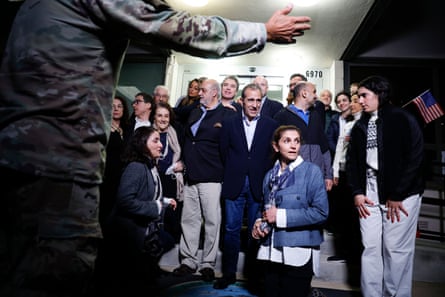
I ask him how he can afford to take on so much work for free. “People can’t really make a living doing this work,” he says bluntly. “You don’t have a lot of human rights lawyers out there doing the work that needs to be done in the way that it needs to be done, which is combining legal, political and public relations advocacy on these cases, because it’s just a grind. It’s just a never-ending grind.” The work sometimes pushes him to his limits.
Genser’s golden formula is one he quite literally improvised as an intern in the spring of 2000. He was a 28-year-old idealist brought up in Rockville, Maryland, with a strict moral code rooted in his Jewish faith. His great-grandparents had escaped from eastern Europe at the turn of the 20th century with nothing but the clothes on their backs and he was raised with a love of the United States and the freedom it had offered his family fleeing persecution.
It was this sense of duty – an obligation to pay the US back, if you will – that moved him to take action when hearing about the case of the British-Australian citizen James Mawdsley, who was held in Myanmar.
Mawdsley had witnessed burned villages and mass graves at the hands of the Burmese junta and had been arrested multiple times for publicizing what he saw. At his trial on 1 September 1999, Mawdsley was convicted of illegal entry and sedition, and given a 17-year sentence.
Over 5,000 miles away, Genser, then a second-year law student from the University of Michigan on a work placement in a London law firm, felt compelled to help. In March 2000, he asked his boss if he could contact Mawdsley’s family and offer some assistance. With the boss’s blessing he did, explaining that while he was only a law student, he had some ideas that could possibly bring Mawdsley back home. The family gladly took him up on his offer.
First, he filed the case with the United Nations’ working group on arbitrary detention in Geneva. Then he managed to get the case brought on pro bono at his subsequent internship at a law firm in Washington. He even managed to get members of Congress involved – despite Mawdsley being British.

“I had a master’s degree in public policy, but I didn’t know anybody on Capitol Hill. I was literally cold-calling the offices of people on key committees and saying, ‘Hey, my name is Jared Genser. I’m helping this guy, James Mawdsley, a British guy, he’s got this long prison term. I can send you some information about the case,’” Genser explains. People would ask if he was the family’s lawyer or what firm he was with and he would tell them the truth – he was a law student, working on his own.
“I’ve had many people who are friends of mine say to me that ‘you have this ability to force people to become your friend’. In other words, when you advocate for a cause greater than yourself, and you’re doing it pro bono, and you do it with a sense of earnestness, with zero expectations of help, but with a compelling set of facts that have to be bulletproof, then a lot of people will want to listen, and some will actually want to help.”
Genser managed to persuade 23 members of Congress to sign a bipartisan letter pressing Myanmar to free Mawdsley, and the US state department sent it to the Myanmar consulate.
In October that year, when Genser was back at law school, he got a call informing him that Mawdsley would be freed and deported to London. Elated, he flew to Heathrow airport to meet him. The 27-year-old Mawdsley promptly thanked him for saving his life.
It was a surreal moment for Genser.
“I realized I could get a white man out of a Burmese prison … but could I get a Chinese man out of a Chinese prison, a Sudanese man out of a Sudanese prison?”
He didn’t know the answer, but he knew he wanted to try.
His answer came sooner than expected. A year out of law school, Genser’s second big victory was working to get Ayub Masih, a 26-year-old Pakistani Christian, off death row in Islamabad. Masih had been arrested in 1996 for allegedly violating Pakistan’s blasphemy laws. The case was brought to Genser’s attention through religious groups he was affiliated with.

Genser got to work immediately, reaching out to Washington’s most influential legal and diplomatic minds to get involved. He once again filed a motion with the UN working group on arbitrary detention and managed to get a dozen key members of the US Senate appropriations committee to write a personal letter to Pervez Musharraf, the leader of Pakistan at the time. Approximately six weeks later, on 15 August 2002, Pakistan’s supreme court acquitted Masih of the blasphemy charges and ordered his release.
Genser then worked all his contacts to perform the minor miracle of not only getting Masih to a safe house in Pakistan, but also getting a humanitarian parole visa issued within 48 hours to enable Masih to fly out of the country. On 4 September, Genser greeted him at Washington’s Dulles airport, where Masih hugged him tightly and said: “God bless you, God bless you, God bless you.”
“All the pieces came together in the right way,” Genser says. “This was not my victory, this was a collective victory. But I had developed the strategy, I had moved the pieces around, and the fact that I made this happen, I actually was just in shock. I couldn’t believe it. I was just overwhelmed, and I cried. But then I was like: I can do this work. James Mawdsley wasn’t a fluke. This is a pocket study guide out of prison, and it can save a guy’s life.”
Genser was hooked.
His first few jobs involved him working overtime at consulting and law firms and excelling so he could bring on pro bono clients. He started his own NGO, Freedom Now, in 2001, so that he could have a firm to represent when cold-calling state officials. In 2011, he started his own law firm, Perseus Strategies. Currently between 30% and 40% of the cases his firm takes on are pro bono. The others range from international parental child abduction to neurotechnology.
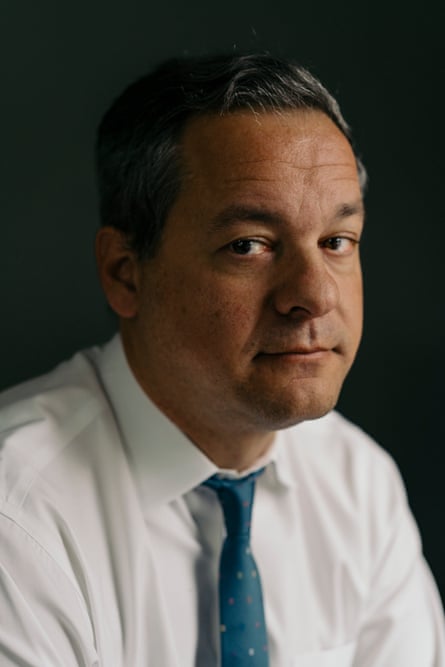
There is no typical day in his line of work, as each case and country has its own peculiarities. He recalls an early example, when he was hired by Aung San Suu Kyi’s family in 2006.
Aung San Suu Kyi was a democracy activist and leader of Myanmar’s National League for Democracy. She had been arrested numerous times since 1998, spending several stints under house arrest. On 30 May 2003, she survived an assassination attempt and was taken into “protective custody” by the junta. Dozens of NGOs wanted to help, but there was no incentive for them to work collectively.
“One day, as I was sitting around, thinking about how to get all the NGOs to work together, I came up with an idea: why don’t we do a letter to Ban Ki-moon, the secretary general of the UN, from as many former presidents and prime ministers as we can round up?” Genser says.
“The way that I pitched it to all the different NGOs was to say: ‘Look, this is something that’s never been done before. How about everyone works together on a joint letter? We agree on the text, or that we’re going to bring all these people into a single letter, and then on the day of the release, everybody can put out their own press release saying that they were part of it.’”
His idea worked. In December 2008, 112 former heads of state delivered a signed a letter to Ban, who visited the country shortly after. It didn’t immediately get Aung San Suu Kyi released, but it drew global attention to her cause and started a series of events that would eventually lead to her freedom in 2010.
“What I learned over the course of my career is that the way you get a political prisoner out of jail is not by lots of noise, but it’s about thinking very carefully and strategically about how to sequence the series of activities that you’re going to do,” Genser says, explaining that you need to have a burst of public attention followed by a lull and another higher burst of attention. “If you’re making constant low-level noise, the government doesn’t even notice,” he adds.
Genser tells stories of creative strategies like staging a petition in front of the Chinese embassy in Washington DC to deliver a birthday card to the democracy activist Yang Jianli, who was in prison in Beijing at the time. Or his Cambodian American client, Theary Seng, taking the initiative to dress up as a chained Statue of Liberty for her treason verdict at Phnom Penh’s municipal court.
But not every one of his cases has been a success.
He describes the hardest day of his career as the day his client, Liu Xiaobo, a Chinese democracy activist and Nobel peace prize laureate, died of cancer while serving an 11-year prison sentence in north-east China. Genser had gotten to know Liu’s wife seven years earlier. As with all his clients, he had promised her he would be there until the very end. He just wasn’t aware of what that end would look like.
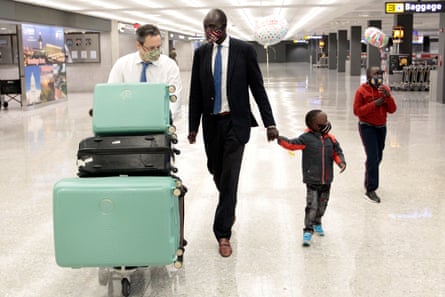
“His wife wasn’t even able to spend a single moment with him alone before he died, and then forcibly having his body cremated and being buried at sea when there is no tradition of burying people at sea in China, and he didn’t even like the ocean,” Genser says tearing up. “They didn’t respect his customs.
“When you lose one like that, after having fought for so long, it’s utterly devastating,” he adds.
Over time, he’s become more discerning and carefully evaluates what cases he chooses to take on. His decision to represent a client broadly rests on three main criteria: he needs to firmly believe that the person is innocent; their arrest needs to be representative of a broader set of abuses in the country; and he needs to be directly retained or in contact with a member of the family to be able to make and execute decisions quickly. However, he’s the first to admit that his verdict is not always that easily determined and numerous other factors such as geography, financial resources and the specifics of each case carry weight.
“One of the most important things I need to do is to understand truly, accurately and precisely what it was that got this person arrested, in general and at this specific moment in time, in this particular way, and for this set of offenses,” he says.
While Genser may be a hero to the families he represents, he’s an enemy to many of the states he’s freed them from.
He has been banned from several countries, including Cambodia and the Maldives, and his movements are closely monitored in many others. In June this year, while attending the Oslo Freedom Forum, he was made aware that the Israeli spyware Pegasus had been planted on his phone.
He says he tried to take it as a compliment. “I felt flattered by the love and affection that whoever decided to hack into my device clearly must admire my work, or else they wouldn’t have gone to the trouble,” he jokes, adding that he has always operated under the assumption that any email he sends could end up on the front page of the Washington Post.
Revealing that he has at least two dozen sensitive contacts that he only keeps on paper, Genser says he wasn’t overly concerned about a data breach as he has learned over the years to take precautions with his security.
“I take a lot of risks that are very managed, calculated risks. My goal is not to become a political prisoner myself,” he says.
His biggest concern has always been his loved ones. “I’ve committed to my family repeatedly that I will manage my risks to the maximum extent humanly possible, and I will minimize the risk of anything serious happening to the maximum extent that I can.”
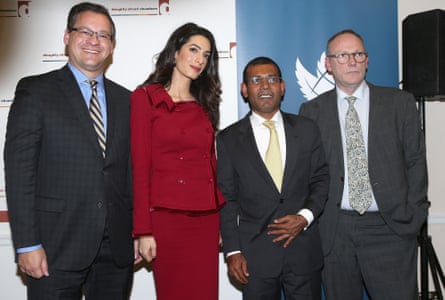
Indeed, one of the hardest parts of his job is trying to juggle a work-life balance to be able to spend quality time with his wife and two kids.
“What I do is more than just a job, the intensity of it, the midnight phone calls and interrupted vacations,” he acknowledges, adding that he is acutely aware of that fact, and takes great pains to be as involved as he can with day-to-day family life, driving his son to ice hockey games or cooking with his daughter.
He has made a point of not keeping his work separate from his family. Many of his pro bono clients stay with him when they are visiting DC, and he’s formed a tradition of hosting former clients at his home for a Shabbat dinner.
“Shabbat is a day to put things down to rest. And for me, symbolically, it’s a day that I can put down the work and say, ‘This is over.’ But more than that, I can share my religious tradition with them, and what it means and why it’s important to me,” he says.
He says whenever he takes on a new case, he thinks about the miracle that needs to be performed and will often say a prayer. The Shabbat dinner brings that process full circle for him, a meaningful closing ritual on the families’ journey together.
“There’s a special prayer in Judaism for when you witness a miracle, and so it’s not a prayer you get to say very often. But what has been for me, the most special moment of these Shabbat dinners, is when I get to say that,” he adds.
It’s an equally special moment for his clients.

“Jared for me was a blessing,” says Berta Valle, a journalist and the wife of the Nicaraguan political activist Félix Maradiaga, who was released from prison and flown to the US in February this year. The couple joined Genser for a Shabbat dinner a few days after Maradiaga had landed on US soil.
“It was truly an unbelievable sight to behold – my husband, Félix, sitting at that table alongside our daughter, Alejandra, in Jared’s house. It was a moment of pure joy and gratitude, and the significance of the [prayer] reading resonated deeply with each and every one of us,” she says.
Valle says there were moments when the weight of uncertainty and pain became overwhelming. But Genser never lost faith in the possibility of her husband’s release, she says.
“As someone who holds faith close to their heart, I couldn’t help but reflect on how God often works miracles through the actions of individuals. It was undeniable that a miracle had unfolded before our eyes, and Jared in his own right stood as one of the most potent instruments through which that divine will materialized into reality,” she says.
Reacting to the recent terror attack by Hamas in Israel, Genser says it “shocked the conscience”, but also stresses that Israel “has an obligation to ensure it exercises its right to self-defense in full compliance with international law”.
He describes the complexity of the situation: “Not only are the hostages hidden in Gaza in a war zone – making recovery very difficult – but Hamas has threatened to broadcast its execution of Israeli hostages, among whom are some 30 children and babies. As much as foreign hostages in countries like Iran, Russia and China suffer, even those regimes don’t cross that line.
“In these circumstances, all the families of Hamas’s hostages can do now is to keep their loved ones’ pictures and stories in the news and urge Israel, the US, Qatar and the UN to do everything possible to get out the most vulnerable hostages before an invasion – and pray. It will only get harder from here,” he adds candidly.
What advice would Genser give to others wanting to get into the business?
“Being relentless is such a character trait that it has to be central to who you are if you want to get anything done. Not only getting a job, but, frankly, doing the job well,” he says.
He advises getting as many internships as possible for maximum exposure to what is a broad field, and warns that in addition to a good legal mind and a ton of hard work, you need “a dose of magic and a prayer”.
“At the end of the day, all the hard work is worth it in a single instant, on the day the person is released from prison. I cry every single time it happens. I’m a wet noodle, as my wife would call me.”
[ad_2]

